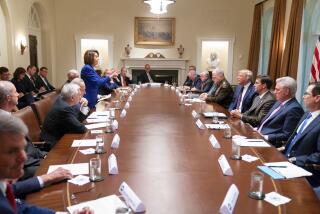Bush faults Pelosi over trip to Syria
WASHINGTON — House Speaker Nancy Pelosi’s trip to Syria sparked a high-profile clash with the White House on Tuesday, with President Bush criticizing her for potentially undermining U.S. foreign policy.
The administration, asserting that Syria has aided terrorists and played a significant role in destabilizing the Middle East, has reined in its dealings with the country’s government.
Commenting on Pelosi’s visit, Bush said, “We have made it clear to high-ranking [U.S.] officials, whether they be Republicans or Democrats, that going to Syria sends mixed signals.”
Pelosi, who arrived in Syria on Tuesday and planned to meet with President Bashar Assad today, is the most prominent U.S. official to travel there since the administration rolled back diplomatic ties in early 2005.
The San Francisco Democrat shrugged off Bush’s criticism, pointing out that the White House was silent over the weekend when three Republican congressmen -- Reps. Frank R. Wolf of Virginia, Joe Pitts of Pennsylvania and Robert B. Aderholt of Alabama -- were in Syria and met with Assad.
“I think that it was an excellent idea for them to go,” Pelosi said. “And I think it’s an excellent idea for us to go as well.”
Bush, speaking at a news conference in the White House Rose Garden, noted that Syria was on the State Department list of nations that sanctioned state-sponsored terrorism. And he stood by his policy -- which some veteran U.S. diplomats have questioned -- of limited contact with the country or its leaders.
“Sending delegations doesn’t work,” he said. “It’s simply been counterproductive.”
He added, “Photo opportunities and-or meetings with President Assad lead the Assad government to believe they’re part of the mainstream of the international community when, in fact, they’re a state sponsor of terror.”
Pelosi’s visit, coming in the wake of recent votes in the House and Senate that ignored a Bush veto threat and backed a timetable for withdrawal of U.S. troops from Iraq, signals an escalation in the political battle between the Republican administration and the Democratic Congress for leadership in foreign policy.
In scheduling her trip, Pelosi demonstrated she was eager to implement the advice of a blue-ribbon advisory group that called on the U.S. to open a dialogue with Syria as part of the effort to quell the violence in Iraq.
The group -- headed by Republican James A. Baker III, who served as secretary of State under Bush’s father, and Democrat Lee H. Hamilton, a former House member from Indiana -- issued its report late last year. Although Bush praised its efforts, he ignored many of its suggestions, including the revised policy toward Syria.
Pelosi, who stopped in Israel on Sunday, said she planned to press Assad to not help the militant groups Hamas and Hezbollah and to support Lebanon’s democratically elected government.
“We have no illusions, but we have great hope,” she said of her meeting with the Syrian leader.
The White House views Hamas and Hezbollah as terrorist groups that operate with assistance from Syria.
And it accuses Assad of attempting to cause turmoil in Lebanon.
Pelosi, traveling during a congressional recess, also plans stops in Lebanon and Saudi Arabia.
Her delegation includes the chairman of the House Foreign Affairs Committee, Rep. Tom Lantos (D-Burlingame), as well as Reps. Henry A. Waxman (D-Los Angeles); David L. Hobson (R-Ohio); and Keith Ellison (D-Minn.), the first Muslim elected to Congress.
Sen. John F. Kerry (D-Mass.), who visited Syria last year, defended Pelosi’s trip.
“Effective foreign policy often requires talking with countries who aren’t our friends,” he said in a statement.
But Danielle Pletka of the American Enterprise Institute, a conservative think tank in Washington, disagreed.
“There has always been a battle between Congress and the White House over foreign policy,” she said.
“The issue here is not about foreign policy. The issue is about standing with enemies of the United States to score cheap political points.”
The Pelosi dispute comes amid a simmering conflict between the White House and Congress over Bush’s request for more money to pay for the Iraq war.
The House and Senate bills approving the request include timetables for troop withdrawal.
At his news conference, Bush continued his attack on those conditions and said they had no chance of becoming law because of his veto power.
“Congress should not tell generals how to run the war,” he said. “Enough politics.”
He warned that if Congress failed to act soon to approve the money without the withdrawal provisions, “there will be significant consequences” for the military.
“The bottom line is this: Congress’ failure to fund our troops on the front lines will mean that some of our military families could wait longer for their loved ones to return from the front lines,” he said. “Others could see their loved ones heading back to the war sooner than they need to.”
Senate Majority Leader Harry Reid (D-Nev.) responded that Bush would bear the blame for a continuing stalemate on war funding.
If he carries out his veto threat, Bush “will have delayed funding for troops and kept in place his strategy for failure” in Iraq, Reid said in a statement.
*
More to Read
Get the L.A. Times Politics newsletter
Deeply reported insights into legislation, politics and policy from Sacramento, Washington and beyond. In your inbox three times per week.
You may occasionally receive promotional content from the Los Angeles Times.










